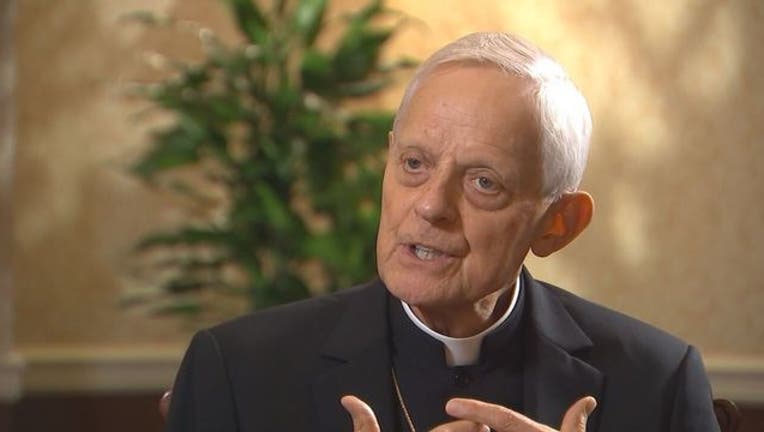Pope accepts Cardinal Wuerl's resignation amid scandal

Cardinal Donald Wuerl
VATICAN CITY (AP) - Pope Francis accepted the resignation Friday of Washington Cardinal Donald Wuerl after he became entangled in two major sexual abuse and cover-up scandals and lost the support of many in his flock.
But in a letter released by Wuerl's office, Francis praised his longtime ally and suggested Wuerl had unfairly become a scapegoat, having made some "mistakes" in handling sex abuse cases, but not having covered them up.
With the resignation, Wuerl becomes the most prominent head to roll in the scandal roiling the Catholic Church after his predecessor as Washington archbishop, Theodore McCarrick, was forced to resign as cardinal over allegations he sexually abused at least two minors and adult seminarians.
A Vatican statement Friday said Francis had accepted Wuerl's resignation, but named no replacement; Wuerl's office provided the letter in which the pope asked him to stay on in a temporary capacity until a new archbishop is found.
The decision came after months in which Wuerl, who turns 78 in November, initially downplayed the scandal, insisted on his own good record, but then progressively came to the conclusion that he could no longer lead the archdiocese.
In his letter accepting the resignation, Francis said he recognized that in asking to retire, Wuerl had put the interests and unity of his flock ahead of his own ambitions, as all shepherds must do.
"You have sufficient elements to justify your actions and distinguish between what it means to cover up crimes or not to deal with problems, and to commit some mistakes," Francis wrote. "However, your nobility has led you not to choose this way of defense. Of this I am proud and thank you."
Wuerl had submitted his resignation to Francis nearly three years ago, when he turned 75, the normal retirement age for bishops. But Francis kept him on, as popes tend to do with able-bodied bishops who share their pastoral priorities.
But a grand jury report issued in August on rampant sex abuse in six Pennsylvania dioceses accused Wuerl of helping to protect some child-molesting priests while he was bishop of Pittsburgh from 1988 to 2006. Simultaneously, Wuerl faced widespread skepticism over his insistence that he knew nothing about years of alleged sexual misconduct by McCarrick.
Wuerl has not been charged with any wrongdoing but was named numerous times in the grand jury report, which details instances in which he allowed priests accused of misconduct to be reassigned or reinstated.
In one case cited in the report, Wuerl - acting on a doctor's recommendation - enabled priest William O'Malley to return to active ministry as a canonical consultant in 1998 despite allegations of abuse lodged against him in the past and his own admission that he was sexually interested in adolescents. Years later, according to the report, six more people alleged that they were sexually assaulted by O'Malley, in some cases after he had been reinstated.
In another case, Wuerl returned a priest to active ministry in 1995 despite having received multiple complaints that the priest, George Zirwas, had molested boys in the late 1980s.
Wuerl apologized for the damage inflicted on the victims but also defended his efforts to combat clergy sex abuse.
His defenders have cited a case that surfaced in 1988, when a 19-year-old former seminarian, Tim Bendig, filed a lawsuit accusing a priest, Anthony Cipolla, of molesting him. Wuerl initially questioned Bendig's account but later accepted it and moved to oust Cipolla from the priesthood. The Vatican's highest court ordered Wuerl to restore Cipolla to priestly ministry, but Wuerl resisted and, after two years of legal procedures, prevailed in preventing Cipolla's return.
"No bishop or cardinal in the nation has had a more consistent and courageous record than Donald Wuerl in addressing priestly sexual abuse," contends Bill Donahue, president of the Catholic League.
Wuerl's archdiocese issued a series of similar plaudits on Friday, coinciding with the Vatican announcement. They included a letter from the archdiocesan chancellor Kim Vitti Fiorentino, who lamented that Wuerl's "pioneering leadership in the enhancement, implementation and enforcement of historically innovative child protection policies was overshadowed by the (Pennsylvania grand jury) report's flaws and its interpretation by the media."
A joint statement by Washington auxiliary bishops also praised Wuerl for his service and pastoral care and said his decision to step down was a "clear manifestation of his love and concern for the people of the archdiocese."
The Rev. Thomas Reese, a Jesuit priest who writes for Religion News Service, described Wuerl as an ideological moderate.
"He was totally enthusiastic about John Paul II, and then Pope Benedict, and now he's totally enthusiastic about Pope Francis," Reese said. "There are not many people in the church who are totally enthusiastic about all three of them."
Numerous conservative Catholic activists and commentators, though, considered him too tolerant of the LGBT community and too liberal on some other issues. They resented his pivotal role a decade ago in resisting a push by some of his fellow bishops to deny Communion to Catholic politicians who support the right to abortion.
Wuerl was born in Pittsburgh, attended Catholic University in Washington and received a doctorate in theology from the University of Saint Thomas in Rome. He joined the priesthood in 1966, was ordained a bishop by Pope John Paul II in 1986, and served briefly as auxiliary bishop in Seattle before going to Pittsburgh.

